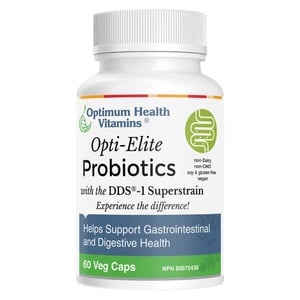 Due to the fact that (1) our diets are largely devoid of appropriate bacteria, (2) that many things in our daily lives contribute to the destruction of intrinsic probiotics, and (3) that probiotic supplements are extremely safe and well-tolerated by most people, it is fairly easy to conclude that pretty much everyone can benefit from consuming probiotics regularly.
Due to the fact that (1) our diets are largely devoid of appropriate bacteria, (2) that many things in our daily lives contribute to the destruction of intrinsic probiotics, and (3) that probiotic supplements are extremely safe and well-tolerated by most people, it is fairly easy to conclude that pretty much everyone can benefit from consuming probiotics regularly.
There are, however, several conditions that can be treated or prevented through probiotic therapy. These, together with current research on their treatment with probiotics, are listed below.
Who needs probiotics and what are they helpful for?
Antibiotic-associated Diarrhea: Antibiotic-associated diarrhea (AAD) results from an imbalance in the colonic microbiota caused by antibiotic therapy. Microbiota alteration changes carbohydrate metabolism with decreased short-chain fatty acid absorption and an osmotic diarrhea as a result. Another consequence of antibiotic therapy leading to diarrhea is overgrowth of potentially pathogenic organisms such as Clostridium difficile.Probiotic treatment might reduce the incidence and severity of AAD as indicated in several meta-analyses. For example, treatment with probiotic formulations including Lactobacillus rhamnosus may reduce the risk of antibiotic-associated diarrhea, improve stool consistency during antibiotic therapy, and enhance the immune response after vaccination.
overgrowth of potentially pathogenic organisms such as Clostridium difficile.Probiotic treatment might reduce the incidence and severity of AAD as indicated in several meta-analyses. For example, treatment with probiotic formulations including Lactobacillus rhamnosus may reduce the risk of antibiotic-associated diarrhea, improve stool consistency during antibiotic therapy, and enhance the immune response after vaccination.
A 2007 preliminary study at Imperial College London showed that a commercially available probiotic drink containing Lactobacillus casei DN-114001 and yoghurt bacteria might reduce the incidence of antibiotic-associated diarrhea and C difficile-associated diarrhea.
The efficacy and safety of a daily dose of Lactobacillus acidophilus CL1285 in affecting AAD was demonstrated in one preliminary study of hospitalized patients.
Colon Cancer: In laboratory investigations, some strains of LAB (Lactobacillus delbrueckii subsp. bulgaricus) have demonstrated anti-mutagenic effects thought to be due to their ability to bind with heterocyclic amines, which are carcinogenic substances formed in cooked meat. Animal studies have demonstrated that some LAB have evidence for acting against colon cancer in rodents, though human data are inconclusive.Some human trials hypothesize that the strains tested may exert anti-carcinogenic effects by decreasing the activity of an enzyme called β-glucuronidase(which can generate carcinogens in the digestive system). Lower rates of colon cancer among higher consumers of fermented dairy products have been observed in one population study.
Cholesterol: Animal studies have demonstrated the efficacy some strains of LAB to be able to lower serum cholesterol levels, presumably by breaking down bile in the gut, thus inhibiting its reabsorption (which enters the blood as cholesterol).
A meta-analysis that included five double blind trials examining the short term (2-8 weeks) effects of a yogurt with probiotic strains on serum cholesterol levels found a minor change of 8.5 mg/dL (0.22 mmol/L) (~4% decrease) in total cholesterol concentration, and a decrease of 7.7 mg/dL (0.2 mmol/L) (~5% decrease) in serum LDL concentration.
A slightly longer study evaluating the effect of a yogurt with probiotic strains on twenty-nine subjects over six months found no statistically significant differences in total serum cholesterol or LDL values. However, the study did note a significant increase in serum HDL from, 50 mg/dL (1.28 mmol/L) to 62 mg/dL (1.6 mmol/L) following treatment. This corresponds to a possible improvement of LDL/HDL ratio.
Immune Function: Some strains of LAB may affect pathogens by means of competitive inhibition (i.e., by competing for growth) and there is evidence to suggest that they may improve immune function by increasing the number of IgA-producing plasma cells, increasing or improving phagocytosis as well as increasing the proportion of T lymphocytes and Natural Killer cells. Clinical trials have demonstrated that probiotics may decrease the incidence of respiratory tract infections and dental caries in children. LAB products might aid in the treatment of acute diarrhea, and possibly affect rotavirus infections in children and travelers' diarrhea in adults.
A 2010 study suggested that probiotics, by introducing "good" bacteria into the gut, may help maintain immune system activity, which in turn helps the body react more quickly to new infections. Antibiotics seem to reduce immune system activity as a result of killing off the normal gut bacteria.
A 2007 study at University College Cork in Ireland showed that a diet including milk fermented with Lactobacillus bacteria prevented Salmonella infection in pigs.
Inflammation: Some strains of LAB may modulate inflammatory and hypersensitivity responses, an observation thought to be at least in part due to the regulation of cytokine function.Clinical studies suggest that they can prevent reoccurrences of inflammatory bowel disease in adults, as well as improve milk allergies. They are not effective for treating eczema, a persistent skin inflammation. How probiotics may influence the immune system remains unclear, but a potential mechanism under research concerns the response of T lymphocytes to pro-inflammatory stimuli. A 2011 study found that mice given Lactobacillus rhamnosus JB-1 showed lower levels of stress and anxiety than controls.
IBS: In one study, a commercial strain of Bifidobacterium infantis improved some symptoms of irritable bowel syndrome in women. A separate small study showed that a strain of Lactobacillus plantarum, may also be effective in reducing IBS symptoms. A study focused on Bifidobacterium animalis showed a reduction in discomfort and bloating in individuals with constipation-predominant IBS, as well as helping to normalize stool frequency in said individuals.
Below is a list of various ailments that probiotics have been clinically proven to help with:
- lower LDL and total cholesterol
- increase (good) HDL-cholesterol
- reduce blood pressure among hypertensive patients
- produce ACE-inhibitor molecules (reduces blood pressure)
- inhibit H. pylori (and ulcers)
- reduce uninary oxalate levels (associated with kidney stones)
- reduce anemia
- inhibit keratoconjunctivitis (when used as eye drops)
- decrease triglycerides (linked to heart disease and stroke)
- decrease PTH (marker for bone loss)
- maintain remission of diverticular disease
- improve glucose control (reduce symptoms of diabetes)
- decrease occurence of colds and influenza
- reduce risk of ear infections
- reduce burn infections (topical)
- increase burn healing
- reduce symptoms and aid healing of multiple traumas among injured patients
- improvement of liver function
- decreased risk of cirrhosis
- help restore healthy liver enzymes (in mild alcohol-induced liver injury)
- inhibit pathogenic bacterial infections including salmonella, E Coli, Pseudomonas aeruginosa, pancreatic sepsis, postoperative infections, C.difficle, bronchial infections, S. pyogenes
- increase immune response in HIV/AIDS patients
- decrease symptoms of HIV/AIDS
- stimulation of immunity in HIV children
- production of virus-specific antibodies
- inhibition of candida and fungal overgrowth
- inhibition of severe systemic inflammatory response syndrome
- increase growth rates (in infants)
- reduce IgE eczema in infancy
- reduce infant colic
- stimulate growth and feeding among preterm infants
- reduce necrotizing enterocolitis (primarily occurs in infants)
- normalize gut colonization similar to breast-fed infants among formula-fed infants
- help re-establish the pH of the vagina
- inhibit vaginal candidasis, vaginosis and vaginitis
- reduce mastitis
- helps prevent atopic eczema, and reduce allergic response and symptoms
- reduce asthma symptoms
- reduce constipation
- reduce nausea
- reduce flatulence
- reduce stress-induced GI problems
- reduce intestinal permeability
- reduce IBS symptoms
- reduce dyspepsia (general indigestion)
- relieve and inhibit ulcerative colitis
- increase calcium absorption
- increase appetite
- increase sleep quality and duration
- increase general health perception
- reduce dental carries
- reduce mouth ulcers
- reduce gingivitis
- inhibit periodontal disease
- reduce plaque on teeth
- inhibit tonsilitiis
- reduce risk of bladder cancer
- increase white blood cell counts after chemoterapy
- inhibit malignant pleural effusions secondary to lung cancer
- inhibit tumor growth of carcinomatous peritonitis/stomach cancer
- reduce the risk of colon cancer
- prevent colorectal tumor growth
- reduce cervix tumors when used in combination radiation therapy
Signs and Symptoms of Inadequate Bacteria:
- Incidence of pathologies listed above
- Candidasis
- Halitosis and body odour
- Acne
- Eczema
- Respiratory issues
- Indigestion, gas, irregular bowel movements
Related article: What Do Probiotic Supplements Do For Allergies?
Disclaimer: The above information is provided for informational purposes only and is not intended to replace the advice of your physician.


